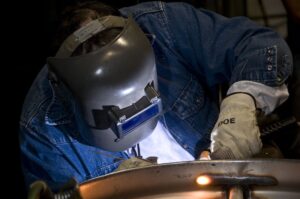Before becoming a fulltime pastor, I taught Agriculture for fifteen years at Central High School. One of the privileges I had during that time was to take students on various field trips throughout Shenandoah County and beyond. I always believed that students learned more “out there” than they did in the classroom and sought to maximize those experiences whenever possible.
Because I taught arc welding skills and a unit on metallurgy, I would make an annual pilgrimage to Agri-Tech on Lakeview Drive south of Woodstock with my Agriculture III students in tow. This manufacturing plant has since been sold and Mckinney Drilling Company now occupies the building, but at that time, it housed a business that constructed fruit weighing, grading, and packaging equipment. 
It was always fascinating for the students to see sheet metal of various thicknesses start out at the beginning of the process; be cut, drilled, punched, bent, welded, bolted, and painted and come out the other end of the plant as a finished product. These fruit handling machines incorporated smart sorting and weighing technologies as well as computer robotics. They were adaptable to everything from apples to oranges and were sold and shipped all over the globe.
Before a new product was constructed, however, engineers had to draw plans and develop specifications for the fabricators to follow. After the design was complete, the manufacturing process had to be organized and the various steps sequenced. In order for the finished product to fulfill its intended purpose, the workers then had to carefully follow the plans and procedures.
As I observed this process year after year on the different trips, it occurred to me how similar it was to God’s work in the life of a believer. When we first come to know Him, we start out as rank blanks, like the sheet metal, with little purpose, design, or direction. God then goes to work cutting off excesses, grinding away rough edges, and bending and shaping us to conform to His plan. Sometimes holes need to be drilled so that we can be fastened to others in churches and small groups to achieve His purposes and maximize our impact.
This process is known as discipleship and can take many years. His tools include His Word, His Holy Spirit, other believers, the church, life’s circumstances, and many more. Although His procedures are often painful at the time, and although we may have no clue what the finished product is to be, our Engineer, Designer, and Fabricator knows exactly what He’s doing.
In all of these ways and many more, God works to make us more like Jesus. He shapes and conforms us to the image of His Son. He also adds the high-tech sophisticated sensing device of His Holy Spirit that enables us to be more compassionate and useful to those around us.
One of the steps near the end of the construction process at Agri-Tech was the paint booth where the black metal received a complete makeover to cover a multitude of less desirable splotches. This also blended the various pieces together and preserved the product from rust and corrosion. How very much like our baptisms near the beginning of our spiritual journeys that not only cover our sins and shortcomings, but which also fill us with the Holy Spirit as a seal of God’s protection over and around us.
The real purpose of the Agri-Tech process was not to build products to sit in the plant for display. These machines were made to work hard processing fruit that fed hungry mouths all over the world. So too, the real purpose of God’s discipleship and development in our lives is not so that we will stay inside our church buildings and look pretty. He designs, saves, and forms us to go work in the world meeting the physical, spiritual, and emotional needs of hurting and needy people.
As we consider the various processes used to make the items in our homes and at our jobs, may they remind us of God’s work forming us according to His plan. May we not resist His efforts, but submit to and cooperate with Him that we might become all He has designed us to be.
In Jesus, George